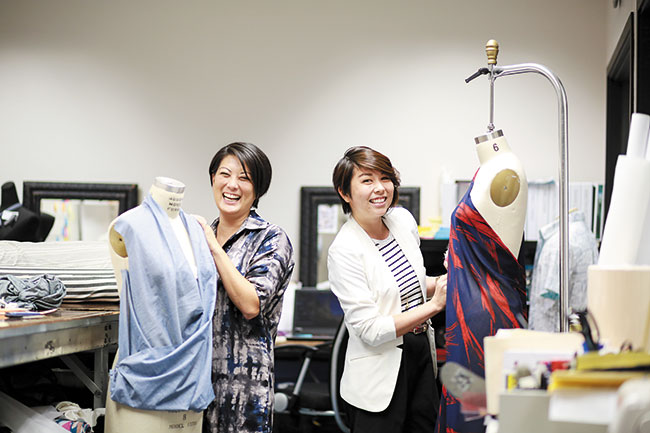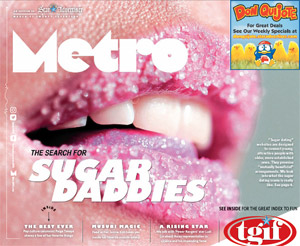A Cut Above

The Cut Collective co-founders Allison Izu Song (left) and Summer Shiigi at work in their office. In addition to mentoring emerging designers and working with outside clients, each also runs their own brand. BODIE COLLINS PHOTOS
It’s first thing on a Monday morning, and the main floor at The Cut Collective already is bustling: One designer sews together a pattern, while two more carefully cut long pieces of fabric, and another two are at the computer, posting to social media and creating fliers.
All of them are young fashion designers — either just launching their lines or still in school — and are learning the industry ropes at The Cut Collective. A fashion incubator-meets-small factory, The Cut Collective provides mentorship for up-and-coming designers to hone their craft while helping outside clients bolster their brands.
Overseeing all of the action this morning are Allison Izu Song and Summer Shiigi, who each run their own clothing brands and co-founded The Cut Collective, which operates out of High Technology Development Center’s business incubator Manoa Innovation Center.
“We want Cut Collective to be a support system for any brand,” Shiigi says. “One of the dreams is to help brands become more nationally recognized, and help them scale up, so creating The Cut Collective is an avenue for businesses to take the next step.”
“We are really trying to champion that ‘Made in Hawaii’ product,” Izu Song says. “We are hoping that it can become a branded good — that it means something to be made in Hawaii.”
- Products from Allison Izu Song’s line, Allison Izu (left) and Summer Shiigi‘s line (right), Ten Tomorrow
- Chantel Willis, an intern at The Cut Collective, cuts a pattern. Willis, a fashion student at University of Hawaii, says her experience there has provided her with a comprehensive overview of the industry
The two met a few years ago, when Shiigi’s styling business intersected with Izu Song’s line. They were fast friends.
“I started to rep her line to my clients, and then to stores, and then she couldn’t get rid of me,” Shiigi jokes, sending them both into laughter.
“Yeah, now we’re stuck together,” Izu Song agrees.
“Forever,” Shiigi adds. Around that time, both of their businesses were beginning to flourish. Booming business, of course, was a good thing. But they lacked one valuable aspect: a space to work.
“You need a lot of space for fashion — you have to store fabric, you have to store inventory,” Izu Song says.
“We had the need for the back end of the business — overhead, cost of goods — and being able to share that in this shared workspace was the seed of it all,” Shiigi recalls.
But soon, they saw a myriad of other needs arise. As they met fellow designers at various events, many of them were facing problems with things like sourcing material or overseeing production.
“So we thought if we are going to have a space, let’s meet production needs, and then before production needs, (designers) need product development, so let’s offer services for that,” Shiigi says. “It was this natural growth.
“We got into this concept that we could make a bigger footprint if we worked together,” she adds.
The Cut Collective serves a range of clients, from independent clothing designers to corporate companies, helping them through all parts of the design process, from initial product development to breaking into the market. It also features a mentorship program for the business side of things — the logistics of accounting, marketing and purchasing materials.
It’s about providing the type of guidance that is not common in the fashion industry — a hard truth that Izu Song learned when she was first trying to launch her brand, called Allison Izu, and ran into a string of manufacturing issues.
“What we try to do for our clients is just really think through all the problems that they are going to encounter before they even realize they are going to encounter it and help them side step it,” Izu Song says. “You are still going to stumble a little, but that is what we are here for.”
That type of troubleshooting comes from their combined years of experience in the fashion industry.
Izu Song knew that she wanted to be a fashion designer ever since she was hanging out in her grandmother’s dress shop as a kid. After graduating from Fashion Institute of Technology in New York City, she did visual merchandising for Macy’s and worked for several smaller brands. When she moved home to Hawaii, she worked retail before launching Allison Izu a few years later. These days, her line can be found at Nordstrom Hawaii, and ordered nationally via Jeans.com.
Shiigi, meanwhile, had been a retail industry veteran before branching off to personal styling through her company Summer Style. When she partnered with Izu Song for The Cut Collective, she also was in the process of creating her own clothing brand, Ten Tomorrow, which launched last year. As a stylist, Shiigi didn’t have a design background, so Izu Song became a mentor to her.
It’s that experience that The Cut Collective seeks to extend to its employees, or “emerging designers,” as they say. An integral part of the staff, the emerging designers work on client accounts, while Izu Song and Shiigi also help them develop their own brands.
Current emerging designers include Mari Nakamura, who has been with The Cut Collective for about a year and is developing Duality, a women’s line that emphasizes two tones.
“I have learned so much in terms of the process and production,” says Nakamura, as she sews a piece for Ten Tomorrow. “We can see everything that goes into making one product.”
Across the room, Sarah Yamashige creates a label that will go with one of Izu Song’s dresses in Nordstrom. Yamashige initially began with The Cut Collective as an intern, before being hired as an emerging designer. Right now, she is in the process of conceptualizing her line’s aesthetic.
“It’s nice that I get to experience all aspects of the industry — that’s something that I really wanted because I am not sure where my strengths are yet, so it’s nice,” Yamashige says.
Both for their clients and with their employees, Izu Song and Shiigi have a particular passion for helping local designers, because they know all about the challenges that Hawaii designers can face.
“Just being a business in Hawaii, you have to do things differently,” Shiigi says. “Everything is imported, rent is really high, retail is really hard.”
“I think the hard thing about being from Hawaii and living on an island is it’s rare for us to think really big and further — and we want to show people that it’s possible to be a Hawaii brand and then bring your brand out to the national market, to the international market,” Izu Song adds. “We want to have that ability to scale up really big.”
Clients of The Cut Collective know that they’re getting quality guidance to do just that — the plans it’s passing along are all things that have been implemented via Izu Song’s and Shiigi’s personal brands. And big things are happening with those brands: They’re both in the process of developing new lines for next year, will be at the next Made in Hawaii Festival and can be found at Boutique Harajuku in California by the end of summer.
For all of the difficulties of distance and expenses, there is, perhaps, at least one distinct advantage of doing business in Hawaii — the family-like atmosphere that The Cut Collective has been able to cultivate.
“For us, work is so fun,” Shiigi says. “To come to work and see these women every day, we are so grateful. We spend literally every day together, all day, and then we all go out to eat dinner together — we still want to hang out.
“Success through collaboration is possible,” Shiigi continues, “or maybe even easier. So we want to open the doors and share it with everyone.”



